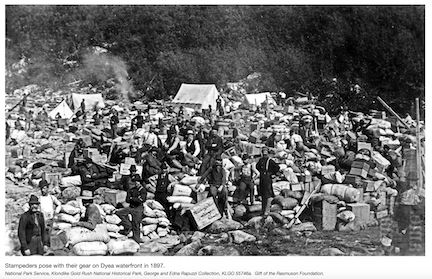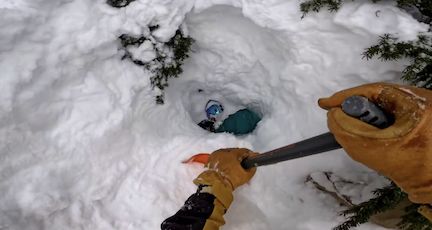Annual Festival Finds Filipinos Nailed to a Cross
Have you been wondering what you could do to commemorate Good Friday? Well, Lonely Planet (an alternative travel site) suggests you might take a bus tour to the town of Barangay San Pedro Cutud, San Fernando, Philippines. There you can watch worshippers--sometimes dozens at at time--nailed to the cross in penance for their own sin.
According to the UK Mail, as of last year (2012) one man, Ruben Enaje, 51, had already taken part in the crucifixion 26 times. The Catholic Church officially condemns the ceremony and calls for its ban. But the "faithful" refuse to comply. As many as 10,000 spectators come to take in the spectacle. None are left to die on the cross. In fact, most remain there only for a short time.
*Click here for images. Caution: Images are graphic.
While one can perhaps, on some level, appreciate these devotees' desire to fellowship with Christ in His sufferings, one can't help but wonder if their misunderstanding of the "once for all" sacrifice of Christ on their behalf defines them more as "faithless" than "faithful."
Christ allowed Himself to be nailed to the cross so that we would NOT have to be! That is the whole point. HE alone was worthy. HE alone was an atoning sacrifice for sin. HE alone could bear the weight of the shame and the guilt of our sin!
Paul declared, "I want to know Christ--yes, to know the power of his resurrection and participation in his sufferings, becoming like him in his death" (Philippians 3:10). But the Apostle never physically climbed on a cross to share in the sufferings of Christ. Rather, Paul recognized that Christ died "for" our sins so that we might share in His sufferings by dying "to" sin.
"For Christ also suffered once for sins, the righteous for the unrighteous, to bring you to God. He was put to death in the body but made alive in the Spirit" (1 Peter 3:18). "How much more, then, will the blood of Christ, who through the eternal Spirit offered himself unblemished to God, cleanse our consciences from acts that lead to death, so that we may serve the living God!" (Hebrews 9:14). "Otherwise Christ would have had to suffer many times since the creation of the world. But he has appeared once for all at the culmination of the ages to do away with sin by the sacrifice of himself" (Hebrews 9:26).
May Your Silver Perish With You
Brian Castner has written an excellent book called Stampede: Gold Fever and Disaster in the Klondike. In it, he chronicles the history of the gold rush to Alaska that occurred at the turn of 20th Century.
There had been an economic depression in the 1890s that was just starting to lift around the time reports came out of the Klondike that people were striking it rich way up north. Castner tells of disease, death, and dismemberment from typhoid fever, violence in cities like Skagway and Dawson City and on White Pass and Chilkoot Trails, avalanches, exposure, starvation, and drownings in the white water rapids of Lake Bennett.

They called it “gold fever” because men (and women) with no experience with the elements and no real plan threw all caution and common sense to the wind in order to strike it rich. The overwhelming majority of them wound up broke and broken.
Peter told a new Christian, “May your silver perish with you” (Acts 8:20). You may remember that Simon the sorcerer was a big shot in Samaria before the traveling missionary, Philip, came to town with the transforming message of Christ. The gospel turned the heads of men and women, including Simon (vv. 12-13). Peter and John come from Jerusalem to impart the miraculous gifts of the Spirit on the new Christians, and Simon was tempted by his past when he saw this (vv. 18-19). Did he see this power as a cash cow or a way to build his already renowned reputation as “someone great” (vv. 9-10)? Part of his sin was the abuse of his money.
There is more than one way that our “silver” may “perish” with us.
- Loving it (1 Tim. 6:10).
- Making it the stuff life is made of (Luke 12:15).
- Storing it up for ourselves and not being rich toward God (Luke 12:21; Mat. 6:19-21).
- Making it an idol (Psalm 115:4).
- Being greedy (Col. 3:5).
- Trying to find satisfaction by it (Ecc. 5:10).
- Letting it motivate us to do wrong (Amos 2:8; Mic. 3:11; Mat. 26:14ff).
- Choosing it over wisdom (Prov. 16:16).
It is said several ways, but God is trying to ensure our spiritual survival. He knows that wealth can become our god when it drives us or becomes our central purpose. He knows that not only is that futile and unsatisfying, but He also knows how destructive such desire is for the other people in the lives of those who are suffering from “gold fever.”
Paul describes it vividly, saying, “But those who want to get rich fall into temptation and a snare and many foolish and harmful desires which plunge men into ruin and destruction. For the love of money is a root of all sorts of evil, and some by longing for it have wandered away from the faith and pierced themselves with many griefs” (1 Tim. 6:9-10).
Let’s not perish with our silver or with an unholy pursuit of it!
Dig Out the Dying
Skier Francis Zuber was zipping down the tree lined slopes of Mt. Baker in northwestern Washington state when he lost control and ended up toppling into the deep powder off the trail. As he worked to right himself, he noticed a snow board protruding from a deep drift. This alone was an unusual sight. But crazier still, the board was moving!
It took him only moments to realize that someone was attached to that board, but apparently buried upside down under the depths of the drift.
He worked quickly to take off his skis so he could make his way to the stranded snowboarder, where he then began feverishly digging to extricate him. Breathless and weary, he just kept scraping at the snow looking for any signs of life. He eventually pulled out a small, yellow rescue shovel (that's one well prepared skier!) to enhance his efforts.
“Hold on! I’m coming! … Hey, you gonna be alright? Can you hear me?”
As he freed the trapped boarder's arms, he exclaimed, “Come on! Help me out! You okay? You alright?”
When he finally reached and uncovered the victim’s helmet, he said with relief, “Okay, you’re good. You’re good. I gotcha. You okay? Can you breathe?
A quiet “yeah” can be heard from beneath the helmet.
“Okay” said Zuber breathlessly, “we’re both gonna just catch our breath and then I’m gonna dig you out, okay?”
Though faint and weak, one can hear the gratitude in the simple, relieved reply, “Thank you.”
Zuber, an unlikely and unexpected hero, stepped up to rescue a stranger from certain death.
We only have such clear and comprehensive details of the harrowing rescue because Zuber was wearing a sports camera on his helmet, recording every moment.
Be sure to click here to watch the heart-pounding video in its entirety.

Like an exuberant skier, we go zipping over the rough and tumble slopes of this life, so engrossed in our own thrills (and spills), that we fail to notice the mass of humanity all around us, buried upside down in the drifts of life — dying people “stuck” in despair, hopelessness, full of fear and regret, feeling utterly alone and invisible.
No doubt that’s how the bruised and beaten man felt, left for dead by robbers on the road from Jericho to Jerusalem, as he lay dying in the street. Many passed by him, walked around him, ignored him. Then one man finally noticed him, took pity, and stepped in to help.
“… and when he saw him, he took pity on him. He went to him and bandaged his wounds, pouring on oil and wine. Then he put the man on his own donkey, brought him to an inn and took care of him” (Luke 10:33b-34, NIV).
An unlikely, unexpected hero, the Samaritan, stepped up to save a dying man.
Does God call us to anything less? No! In fact, He calls us to something more. He calls us to not just “happen” upon these dying ones, but actively, intentionally, purposefully keep our eyes peeled for them, peeled for any signs of life, so that we can jump into action to offer them a life line — the good news of the Gospel.
Don’t turn a blind eye. Be a hero! Look for those whose lives are buried under the burdens of life without Jesus. And with the same feverish urgency and intensity of Francis Zuber, go dig them out!
Then listen for the breathless, relieved reply ... "Thank you."
"He said to them, “Go into all the world and preach the gospel to all creation" (Mark 16:15, NIV).
"How, then, can they call on the one they have not believed in? And how can they believe in the one of whom they have not heard? And how can they hear without someone preaching to them?" (Romans 10:14, NIV).